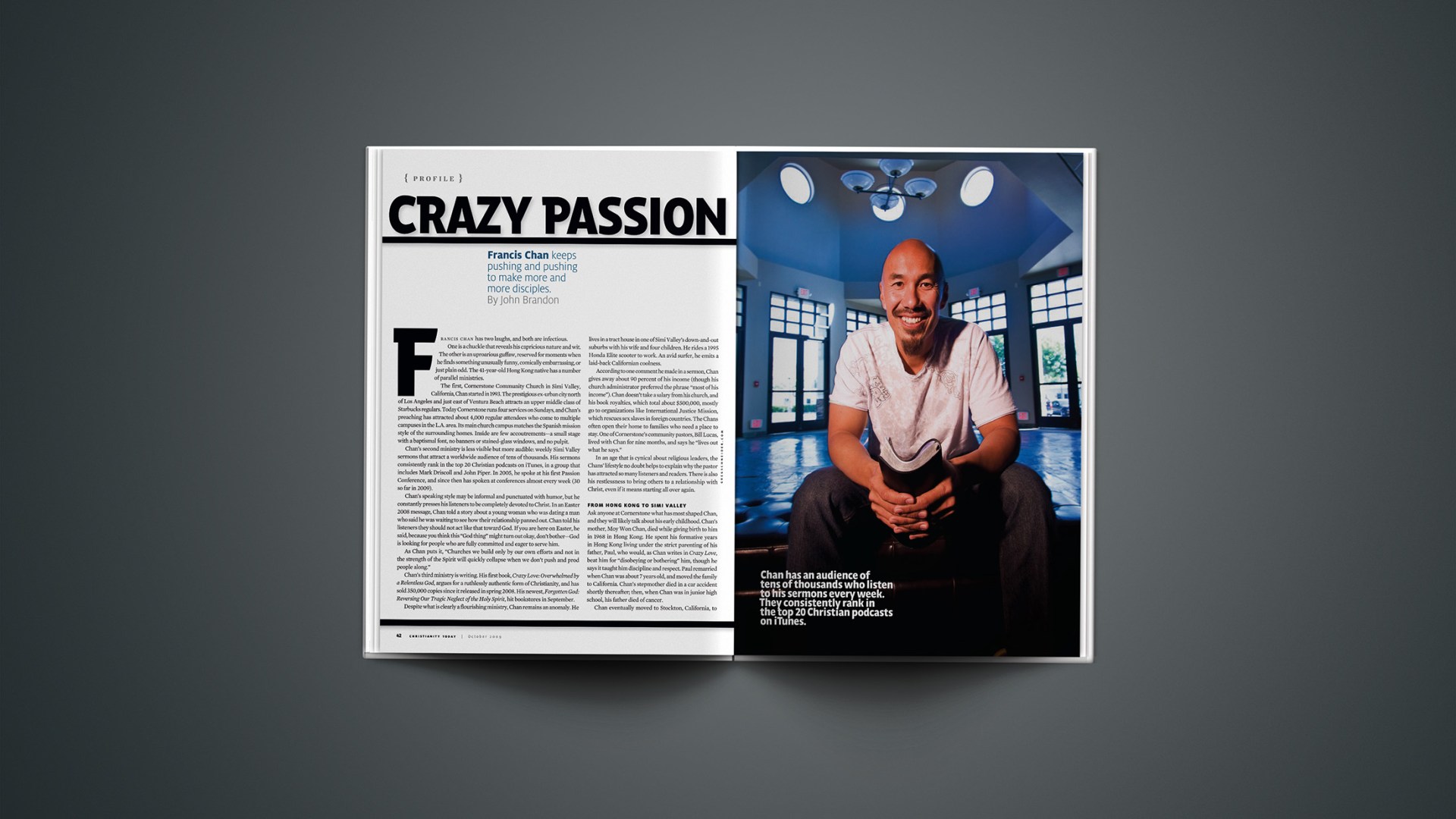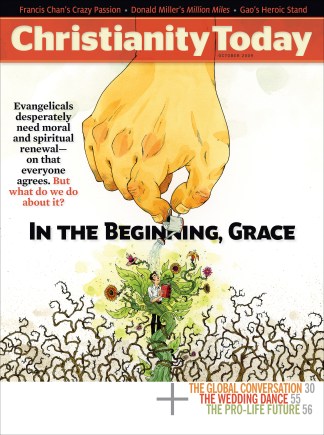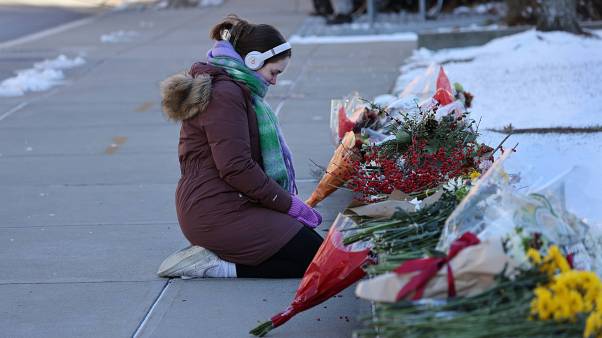Francis Chan has two laughs, and both are infectious.
One is a chuckle that reveals his capricious nature and wit. The other is an uproarious guffaw, reserved for moments when he finds something unusually funny, comically embarrassing, or just plain odd. The 41-year-old Hong Kong native has a number of parallel ministries.
The first, Cornerstone Community Church in Simi Valley, California, Chan started in 1993. The prestigious ex-urban city north of Los Angeles and just east of Ventura Beach attracts an upper middle class of Starbucks regulars. Today Cornerstone runs four services on Sundays, and Chan’s preaching has attracted about 4,000 regular attendees who come to multiple campuses in the L.A. area. Its main church campus matches the Spanish mission style of the surrounding homes. Inside are few accoutrements—a small stage with a baptismal font, no banners or stained-glass windows, and no pulpit.
Chan’s second ministry is less visible but more audible: weekly Simi Valley sermons that attract a worldwide audience of tens of thousands. His sermons consistently rank in the top 20 Christian podcasts on iTunes, in a group that includes Mark Driscoll and John Piper. In 2005, he spoke at his first Passion Conference, and since then has spoken at conferences almost every week (30 so far in 2009).
Chan’s speaking style may be informal and punctuated with humor, but he constantly presses his listeners to be completely devoted to Christ. In an Easter 2008 message, Chan told a story about a young woman who was dating a man who said he was waiting to see how their relationship panned out. Chan told his listeners they should not act like that toward God. If you are here on Easter, he said, because you think this “God thing” might turn out okay, don’t bother—God is looking for people who are fully committed and eager to serve him.
As Chan puts it, “Churches we build only by our own efforts and not in the strength of the Spirit will quickly collapse when we don’t push and prod people along.”
Chan’s third ministry is writing. His first book, Crazy Love: Overwhelmed by a Relentless God, argues for a ruthlessly authentic form of Christianity, and has sold 350,000 copies since it released in spring 2008. His newest, Forgotten God: Reversing Our Tragic Neglect of the Holy Spirit, hit bookstores in September.
Despite what is clearly a flourishing ministry, Chan remains an anomaly. He lives in a tract house in one of Simi Valley’s down-and-out suburbs with his wife and four children. He rides a 1995 Honda Elite scooter to work. An avid surfer, he emits a laid-back Californian coolness.
According to one comment he made in a sermon, Chan gives away about 90 percent of his income (though his church administrator preferred the phrase “most of his income”). Chan doesn’t take a salary from his church, and his book royalties, which total about $500,000, mostly go to organizations like International Justice Mission, which rescues sex slaves in foreign countries. The Chans often open their home to families who need a place to stay. One of Cornerstone’s community pastors, Bill Lucas, lived with Chan for nine months, and says he “lives out what he says.”
In an age that is cynical about religious leaders, the Chans’ lifestyle no doubt helps to explain why the pastor has attracted so many listeners and readers. There is also his restlessness to bring others to a relationship with Christ, even if it means starting all over again.
From Hong Kong to Simi Valley
Ask anyone at Cornerstone what has most shaped Chan, and they will likely talk about his early childhood. Chan’s mother, Moy Won Chan, died while giving birth to him in 1968 in Hong Kong. He spent his formative years in Hong Kong living under the strict parenting of his father, Paul, who would, as Chan writes in Crazy Love, beat him for “disobeying or bothering” him, though he says it taught him discipline and respect. Paul remarried when Chan was about 7 years old, and moved the family to California. Chan’s stepmother died in a car accident shortly thereafter; then, when Chan was in junior high school, his father died of cancer.
Chan eventually moved to Stockton, California, to live with extended family. There he became involved in a local youth group and came to Christ. After attending the Master’s College north of Los Angeles, where he earned a seminary degree, Chan landed a youth pastor position at the Church at Rocky Peak in Chatsworth, California, a short drive from Simi Valley.
During this time, Chan says he separated his religious views from his personal life. “Those were the worst years of my life,” Chan told me. “I learned more intellectually than any other time of my life, but it was a sinful, hypocritical time.”
Chan left the youth position to wait tables at a local restaurant. He says he was confused and disillusioned; he was “falling apart” and ready for a change. During this time, Chan met his future wife, Lisa, who sang in the worship team at a local church. Chan slowly began gathering 10 other families who were also disillusioned with their faith and the church. In 1993 he married Lisa and, two months later, started Cornerstone.
Planting ‘Gatherings’
Chan finds himself at a new juncture. He is stepping aside as day-to-day leader of Cornerstone for several months to begin a new ministry. He will train pastors in nearby Los Angeles County who will in turn gather groups to meet in house churches.
“The main reason to step over to L.A. County is the sheer number of people who live there,” says Chan. “Simi Valley is a city of 100,000 people, but about 15 minutes away are millions of people. We are trying something different—a lot of people in Simi Valley are not ready for the changes we have planned.”
That something different is what he is calling “transforming church.” According to research from Princeton University sociologist Robert Wuthnow, only 25 percent of U.S. young adults attend church, wary as they are of organized religion. Chan is convinced that something needs to change about the way evangelicals do church.
“In church, rather than rehab people, we just put them in a wheelchair and say, ‘We will do everything for you,’ ” says Chan. “‘You don’t have to witness to your neighbors. We will send out fliers and do tv shows and evangelize for you. You don’t have to counsel your neighbors; just give them the church’s phone number.’
“Now we are saying, ‘You be the discipler. You have the Holy Spirit in you, and we want to equip you to reach your neighbors.'”
Chan’s long-term plan involves building the church without having a building. Associate pastor Matt Moore says the experiment is a way to find out how the church can grow without the limits of a building. Each satellite church will have an elder overseeing the local body, and that congregation can choose whether or not to go to the main campus in Simi Valley.
Cornerstone will at first use this model with several small churches that will meet autonomously. The ministry hinges on a website called IAmChurch.org, where the local churches can find sermon videos and other resources.
Chan says these “gatherings” (he does not like the term house church because it implies another building that can limit growth) will be more like a student lab project, where everyone is highly engaged and involved, as opposed to a lecture hall, where only one person speaks. In fact, Chan says a church service should not be the primary, pivotal event for these neighborhood ministries.
“There is nothing normal about this,” Chan said in the first training session. And despite his general vision, he adds, “We don’t even have plans for how this will look three months from now; we will just pray like crazy and ask the Holy Spirit to build his church.” Todd Nighswonger, executive pastor at Cornerstone, says that Crowded House in the United Kingdom and the Soma Communities in Seattle are models for the L.A. County experiment.
Jeff Vanderstelt is an elder and church planter with Soma Communities. He says Soma has 45 small neighborhood churches that convene in six larger groups on a weekly basis. Vanderstelt says Scripture never described the church as such a formal and commercialized entity, but something that’s all about local believers.
“In the beginning stages of the church, people met from house to house and eventually established city churches,” says Vanderstelt. He says the structure is intended to encourage authentic discipleship, where small churches birth more small churches as believers grow and mature, attracting new members. Vanderstelt says the main challenge with this approach is that it requires a shift in leadership perspective, and “not just recruiting volunteers for programs. Many churches have elders who are more like board members, and pastors who are more like managers or directors of programs—not pastors who can lead churches.”
Eddie Gibbs, director of the Institute for the Study of Emerging Churches, says that Chan’s model represents a response to the “post-Christendom context” of America: “For 1,600 years, the church in the West has been one of the central pillars of society, and it operated largely on a come-to-us basis.” Gibbs says the “seeker sensitive” model is the last manifestation of this approach.
“With an increasing percentage of the population distanced from institutional religion,” he says, “churches have to move from an attractional mindset to an incarnational missional model. In other words, churches must become the seekers.”
Push back
Vanderstelt says Cornerstone should move slowly, and Chan himself knows the venture is risky. He has consistently said in sermons that he doesn’t know if a church with such a loose structure can work in the U.S.
In addition, he has discovered that his “church with no walls” has caused no small amount of controversy. Some dissenters say they prefer a weekly large-group gathering with a sermon and worship time.
“There is nothing wrong with having a service, but it was not the big emphasis back in the early church,” says Chan. “People were gathered around the mission and getting the message out. There used to be such a deep commitment to one another.
“The church got screwed up as time went on, but there was so much excitement in the beginning. So many people would come to Christ that you could not fit them all in your church building.”
Brad Smith, president of Bakke Graduate University, applauds Chan’s flexibility regarding buildings and puts it into historical perspective: “When the church was poor and persecuted, it thrived without buildings, staff, or programs. When the church was rich and dominated its culture, it thrived with buildings, full-time staff, and extensive programs.” Smith says there is nothing wrong with buildings or the lack thereof: “God empowers the church to be very flexible and healthy in a variety of circumstances.”
Chan has been pushing another controversial idea that he hopes the gatherings, modeling the early church, will practice: sharing personal possessions with each other. Some say the idea is too “cult like” and impossible to implement in an era of bank loans and car leases. But Chan remains restless about cultural conformity and seems willing to push his listeners to make real changes rather than just consume more information.
“Churchgoers in America are notorious for jumping into movements, even ideas that are hard to listen to,” says Chan. “But when they actually have to change their lifestyle and do something about it, it rarely translates into action.”
Chan recognizes his limitations. He tells of how he was asked to teach at a conference in Iran and realized he had no idea how to help pastors and lay ministers in countries where Christianity is not part of society, where citizens do not take their spiritual freedom for granted. He says leading people to Christ is more than about having an airtight process—the Holy Spirit has to move people. Yet Chan says he will keep trying to reach those around him.
“I have to keep throwing the gospel out there and see what happens,” he says with a laugh.
John Brandon is a freelance writer based near Minneapolis. He also writes for Wired, Popular Science, and Relevant magazines.
Copyright © 2009 Christianity Today. Click for reprint information.
Related Elsewhere:
Francis Chan is a pastor of Cornerstone Community Church and author of Forgotten God and Crazy Love, which are available at ChristianBook.com and other book retailers.
Out of Ur featured a recent video of Chan, and Today’s Christian profiled Chan last year.









